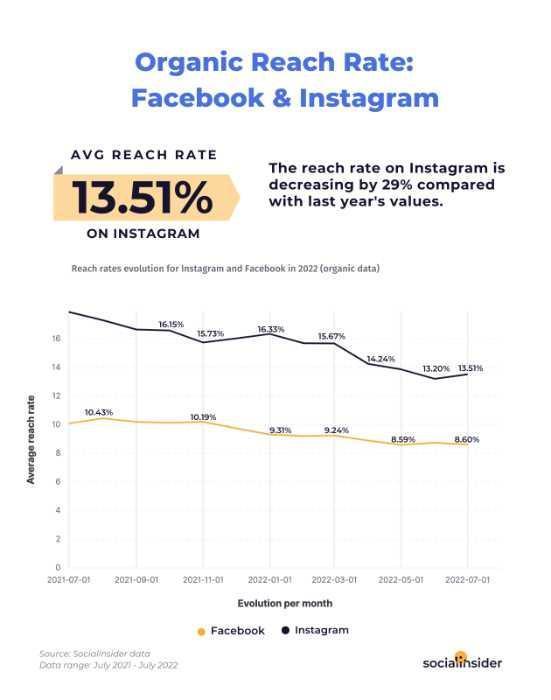Social media marketing is one of the most important aspects of any online marketing strategy. It allows businesses to connect with current and potential customers in a way that wasn’t possible before.
With more and more social media platforms popping up regularly, there are many ways that a brand can connect with its audience through social media.

But, like any other marketing strategy, tracking your social media marketing campaigns and the associated ROI is much needed to determine their effectiveness.
In this guide, we will look at 15 social media marketing metrics you need to track and measure the success of your campaigns.
Why Metrics Are Important To Optimize Social Media Campaigns
Social media allows businesses to share content with a broad audience and build a connection with existing (and potential) customers. This content may range from blog posts to images to videos and beyond.
And by sharing this content, businesses will help their customers learn more about them, what they stand for, and what they have to offer.

Creating a rich and engaging social media presence helps amplify your brand in a way that other digital marketing campaigns, such as paid search, could never provide.
But it’s not easy.
There are many objectives of social media marketing. Still, some of the most important ones include increasing brand awareness, driving traffic to websites or landing pages, and increasing leads or sales. This can be done using organic social media or paid campaigns.
Beyond the noticeable budgetary differences, the main difference between organic and paid social media is that organic social media relies on the platform and the audience to amplify the content.
Of course, every brand wants its posts to go viral–in a good way. However, according to SocialInsider, organic reach continues to decline on some of the most popular platforms, such as Facebook and Instagram.

On the other hand, paid social media involves paying for ads to be placed in front of a specific audience. Although a cost is involved, it provides much more control over who and how many people see your posts or ads.

Like PPC vs. SEO, both paid and organic social media have advantages and disadvantages.
Organic social media marketing is less expensive, but it may be difficult to reach a large audience without paid promotions. In contrast, paid social media marketing allows you to target a specific audience with your ads, which often results in a higher conversion rate. However, it may be costly to maintain a paid social media campaign for the long haul, especially with multiple products to support.
Overall, the best approach is possibly a combination of organic and paid social media marketing. This will allow you to reach the largest audience possible while still targeting the right people with your ads.
However, publishing a few ads and building a social following is not enough to drive social success. To drive home your message, you need to understand more about who is seeing, engaging with, and clicking on your social content.
But, regardless of whether you’re using organic, paid social media, or both, it’s crucial to track your metrics to optimize your campaigns and ensure they are successful. This information is beneficial for businesses to optimize their social media campaigns for even greater success.
But before we get into the specific social media metrics you should be tracking, let’s look at why tracking social media analytics is vital for optimizing your campaigns.

Tracking social media marketing metrics allows you to:
- Identify what content and strategies are performing well
- Make improvements to underperforming content and strategies
- Evaluate the overall success of your social media marketing efforts
- Justify the investment in social media marketing to stakeholders
Top 15 Social Media Metrics That Matter
Now that we understand the importance of tracking social media metrics, let’s dive into the 15 key metrics you should be monitoring, broken down by the customer lifecycle stage.
Awareness Metrics
Awareness metrics are important because they help businesses track how well they achieve their goal of increasing brand awareness.

By tracking how many people see their posts and how much reach they get, businesses will see whether their social media marketing campaigns are even getting in front of their intended audience. After all, if people don’t see the ad, they have no way to engage with it.
Social media awareness metrics typically include:
- Reach: The number of unique users who saw your content
- Impressions: The number of times your content was displayed, regardless of whether it was clicked on or not
- Social media mentions: The number of times your brand was mentioned on social media
- Follower Growth Rate: The increase in the size of your social media following
These metrics give you insights into the visibility and reach of your content.
Consideration Metrics
Consideration metrics are important because they help businesses track how well they achieve their goal of getting people to consider their product or service. This block of metrics takes the user one step further down the purchase journey and helps determine if what you share resonates with them.

By tracking how many people are clicking on their links, watching their videos, or reading their blog posts, businesses are in a better position to decipher whether their social media marketing campaigns are effective or not.
Social media consideration metrics typically include:
- Engagement: The number of interactions with your content, including likes, comments, shares, and clicks
- Engagement Per Follower: Breaking down the metric above by the followers of that particular channel. This will help show how engaged your following is.
- Website traffic from social media: This metric measures how much website traffic is driven to your site through social media channels.
- Click-through Rate (CTR): This measures the number of clicks a link in your social media content receives, divided by the number of impressions it receives.
These metrics show how well your audience connects with and considers your content.
Conversion Metrics
Conversion metrics help businesses monitor how well they achieve their goal of converting leads into customers. By keeping an eye on the number of prospects or customers generated from social media, it’s easier to figure out whether social media marketing campaigns are attracting the right audience.

Social media conversion metrics typically include:
- Social media leads: The number of leads generated through social media channels.
- Social media sales: The number of purchases that are attributed to social media channels
- Goal Value: A monetary value assigned to each goal, which could include an estimated value per new lead or the revenue generated from an online transaction
- Return on investment (ROI): This metric measures the overall return on investment for your social media marketing efforts, taking into account all other metrics and their impact on sales and revenue.
These metrics demonstrate the impact of your social media efforts on achieving business goals.
Advocacy Metrics
Advocacy metrics are essential because they help businesses see how successful they have been in getting customers to become advocates for their products or service.

A social media report template helps monitor the following business metrics:
- The number of followers a business has,
- The number of shares a post has, and
- The amount of positive sentiment a post has received.
Tracking this data is essential for companies to understand whether their social media marketing campaigns effectively turn customers into loyal advocates for the brand.
Social media advocacy metrics typically include:
- Reviews: Social proof is still an essential part of any sales process, so the number of reviews (both positive and negative) on social platforms is worth tracking
- Customer satisfaction: The level of satisfaction expressed by customers on social media, such as adding reinforcing comments to posts
- Brand sentiment: The overall perception and sentiment towards your brand on social media
These metrics (although harder to measure) showcase how well your social media presence fosters brand loyalty and advocacy.
Summary & Key Takeaways
The 15 social media marketing metrics listed in this guide are crucial for businesses to measure the success of their social media marketing campaigns.
By tracking awareness, consideration, conversion, and advocacy metrics, businesses are more informed to understand what’s working well and what needs improvement or tweaks.
Additionally, connecting the dots between social media performance and the resulting web traffic, leads, and sales help businesses correlate social media marketing efforts with their bottom line.
The post 15 Social Media Marketing Metrics You Need to Track appeared first on DigitalMarketer.
Frequently Asked Questions
Motivation is important for entrepreneurs.
When we feel lost or stuck, motivation is what propels us forward. It gives us the strength to face our fears and make decisions that might seem risky or impossible.
Motivation is also an important factor in achieving success. Motivation is a driving force behind success. If we lack it, we can become laziness, unmotivated and unproductive, which ultimately leads to failure.
The key to unlocking your potential is to find ways to motivate yourself. You must find a way to motivate yourself throughout the day.
You can think of it as a muscle. It becomes stronger the more you exercise it. If it's not exercised, it will begin to weaken.
Some of the most successful entrepreneurs are self-motivated. They set goals, plan how to achieve them, and follow through.
However, there will be times when motivation is needed. These are three easy steps that can help you stay motivated.
Step 1) Get inspired. Find an inspiration figure. Someone who is already achieving the things you dream of.
Step 2) Set small goals. Each goal should be achievable. You should be focusing on the next step and not the final goal. You can reach big goals quicker by breaking them into smaller pieces.
Step 3: Reward your self. Reward yourself for achieving your goals. It doesn't have be something tangible, it could just be time spent doing something you enjoy.
Motivation is a choice. Choose to be happy, choose to be successful, choose to live life abundantly.
Get started today if your goal is to make positive changes in your daily life. The first step to making a change is to choose to do so. Then take action. Now is the time to live your dreams.
What makes a successful entrepreneur?
There are two types entrepreneurs: those who make a lot of money and those who do not.
What makes them different is their approach to business. Those who make money concentrate on making more money, while people who make a lot of time work harder to make more.
Money is driven by financial freedom. Their goal is to become rich and stay rich.
They are motivated by fear, greed, and a sense of entitlement. They care little about the long term because they know that they will be set for life once they reach their goals.
This type of person is often referred to as a hustler. They have a focus on the bottom and are able to find ways of increasing revenue without regard to quality.
On the flip side some make time. These entrepreneurs are motivated by passion. They want to create something that is meaningful and will last forever.
They are driven by altruism. They are driven to achieve great things. They care about creating products or services that have a positive impact.
These people are often called dreamers. They are driven by inspiration and vision. They know success requires perseverance, hard work and dedication.
But the most important characteristic of these entrepreneurs is that they are creative. They are always looking for new opportunities.
They thrive on the unknown. They are happy to spend hours researching a topic of interest. They are always open to learning new things because they love learning.
It's also why they can easily adapt to change. They will take on any challenge and get dirty. They don't like mediocrity.
Which type are you? Are you driven by making money or seeking meaning?
Congratulations if you answered yes both questions. You are a successful entrepreneur.
I've had the pleasure of meeting many successful entrepreneurs over my career and one thing struck me was their passion.
Success isn't measured by just monetary wealth. The impact defines them they leave behind.
Steve Jobs, who was not rich but well-known for his philanthropic efforts, is an example. He didn't even own a house until he was in his mid-40s.
His ability create products that changed the course of history was his greatest source of wealth. This is what makes him unique.
Your job doesn't involve accumulating wealth. It isn't to build empires, or amass political power.
Your job is to build relationships with customers and partners. To build trust. To help others succeed.
To make a difference. Your legacy. That's your legacy.
We'd love to talk with you if we can help you build a lasting legacy.
Social Media University will teach you how to generate passive income online. We'll show you how to market your company so that it grows automatically.
What motivates entrepreneurs?
Passion drives us. But, we have an inborn desire to create something meaningful and make a difference. To make a positive difference in the lives of our loved ones and ourselves.
To give back. To help others. To leave a lasting legacy.
We love it. Because we feel called to live life fully, and have success in the things that matter most.
We are driven to fulfill a sense purpose and mission. This cannot be accomplished by money alone.
Find a way for business to be enjoyable. This is where entrepreneurship becomes more than just a job; it is a lifestyle.
Because of this, I am passionate about helping entrepreneurs succeed. My goal is for them to be financially free and have a lasting impact in the world.
It's the only way to create value. I am living proof of this. Sharing your knowledge and expertise with others.
It's not enough to build a great product or service. Understanding your customers and their needs is key. What they are looking.
Doing so will help you to always improve your offering. And therefore, you'll always provide more value.
Customers will be more satisfied if you offer more value. And if you gain more customers, you will sell more products and services. More customers will mean more revenue. If you can generate more revenue, your financial independence will be possible.
Money is not everything. It's a means to an ends. It's not the goal in and of itself.
To truly live a rich, fulfilling life, you can't focus on just money. Focusing on positive change is also important. Contributing. Leaving a legacy. Creating something valuable. Something unique. Something that adds meaning to your life and the lives of other people.
Entrepreneurship requires risk-taking. But it doesn't mean having any rules. It's about being flexible. Adapting. Adjusting. Improving.
If you're true to yourself and hold onto your values and integrity, you will not fail.
Entrepreneurship can be a calling. A vocation. It's an opportunity to contribute. To create wealth. To shape history.
You will be your best self when you embrace all these aspects.
You will not be stopped.
What are the motivations behind entrepreneurs?
Entrepreneurs can choose from three types of motivation. Each type is unique and has its strengths, as well as its weaknesses.
Motivation that is not internal, such as the desire to earn more money, is the most common type. This motivation is often triggered by financial concerns.
External motivation is driven by personal interest, ambition, and desire. This type motivation is more goal-oriented.
The rarest form of internal motivation is the one that's more common. Internal motivation is rare. They don't necessarily seek wealth, but instead pursue other goals like self-development and fulfillment or service to others.
People with internal motivation are often called "passionate" because they find satisfaction in their work.
Finally, intrinsic motivation is the least common kind of motivation. Intrinsic motivation is a person who finds enjoyment and satisfaction working towards achieving a goal.
Intrinsic motivation is a much stronger motivator than either external or internal motivation.
Inner motivation is a result of the inner self. It is based the belief people are endowed with certain talents and capabilities. These talents and abilities enable them to achieve feats that no other person could ever do.
Feeling fulfilled and satisfied when you realize your talents and abilities is a sign of happiness. It feels like we are doing meaningful work.
In other words, intrinsic motivation is what makes us happy. It is knowing we can do anything we put our mind to. This makes us happy.
This feeling of accomplishment keeps you going no matter what the circumstances are.
It's a fact that if you don’t love what you’re doing, then it's not worth doing.
Click here to read more about entrepreneur motivation.
What are the motivations of an entrepreneur
The three main motivations of entrepreneurs are freedom, money and knowledge.
- Freedom means having the ability to do whatever you want whenever you want. This is why we are entrepreneurs even if our current job or situation restricts us.
- It is important to have money. Without it, we wouldn't even think about starting a business. While we can survive on food, water, shelter and money, it is not possible to make ends meet without money.
- Knowledge is the third motivation. Entrepreneurship requires us to constantly learn more and more, which is why we often find ourselves reading books, attending seminars, taking online courses, and learning how to create products and services.
This is what motivates and drives us to reach our goals. It gives meaning and purpose to our lives.
These three elements are why we became entrepreneurs. These are the driving forces that keep us going every day.
If any of these three items are missing, it's possible to pack up and move home. We will never be truly happy if these three things are missing.
How can entrepreneurs motivate staff?
Motivation can come from anywhere. Motivation doesn't have to come from a specific place. All that matters is that it motivates them. Motivation is key for any business, whether it's a carrot or stick approach.
Employees who feel motivated are more likely to do well. To make your team more productive, empower and engage them.
You need to create an environment where they feel valued. A place where they can grow and learn. You can let them share your ideas and not fear of punishment.
A company culture that allows them to thrive and succeed. That's how you keep your best talent happy, loyal and productive.
To maintain the culture, you need to reward those behaviors that help you succeed. This could include giving bonuses for reaching goals, offering training opportunities and providing perks, such as health insurance.
You also need to provide clear direction and communication. Make sure everyone is clear about what they are expected to do and why.
Your policies and procedures should be written down and communicated. Assure that there is someone who can ensure they are adhered to.
Communicate frequently, but most importantly. Make sure your team is informed about the latest happenings in the company. Let your team know what's new and what's up.
Communication is vital. Looking after your team is the best way for you to stay ahead of the game. They'll take care of you.
You could end up spending a lot of money if your employees don't get along well. Research shows that employees who are engaged with their work have higher productivity and profitability than those who struggle for top performers.
It's important that employees understand that they don't all want to work at the exact same pace. Some prefer working alone while others love to collaborate. Each person can be motivated in different ways, so it is up to you which one works for you.
Some may be more inclined to accept recognition than others. You can do what works for you but make sure it is in line with the company's goals.
As the leader, you are responsible for setting the tone. Open-mindedness is key. Listen to your team. Remember, you have to do it yourself if you want it done correctly.
Statistics
- "If you improve by just 1% every single day, in several months, you will have improved by 100%. (carolroth.com)
- Invest at least 30% managing those with authority over you and 15% managing your peers.” (americanexpress.com)
- “Effective communication is 20% what you know and 80% how you feel about what you know. (americanexpress.com)
- Our 10 years of research also shows that 75% of mentored entrepreneurs increased their revenue, and 82% of their businesses survived the first two years. (carolroth.com)
- "Most of the time when people ask me about motivation, 80 percent of the time, I attribute it to gratitude. (entrepreneur.com)
External Links
entrepreneur.com
businessinsider.com
- 101 Best Inspirational Quotes For Entrepreneurs
- SpaceX employees have almost impossible goals: Elon Musk
oberlo.com
inc.com
How To
Are You a TRUE Entrepreneur?
An entrepreneur is someone who creates value for others and himself. He is willing and able to take risks.
He doesn't wait to be offered an opportunity by someone else; he seeks them out. He is a self-starter who can take on any task.
A true entrepreneur can quickly make and execute decisions. He sees the problems clearly, and solves them creatively.
His view is that there is no distinction between business and life. To him, entrepreneurship isn't a job; it's a way of life.
True entrepreneurs never fear failure. Failure is part of the journey to success. True entrepreneurs embrace change and thrive in pressure.
They are determined to achieve success and growth. Most importantly, they love what they do because they enjoy creating value.
They want to be able to provide a successful life for their families and build successful businesses.
So next time you feel unmotivated or confused about whether you should start your own business, ask yourself this question...
"Am I a true entrepreneur?" If you answered yes, then go ahead and take action. If you answered "No", then it might be time for you to rethink your career path.
Did you miss our previous article...
https://consumernewsnetwork.com/technology-news/5-strategies-for-growing-your-business-through-digital-marketing






